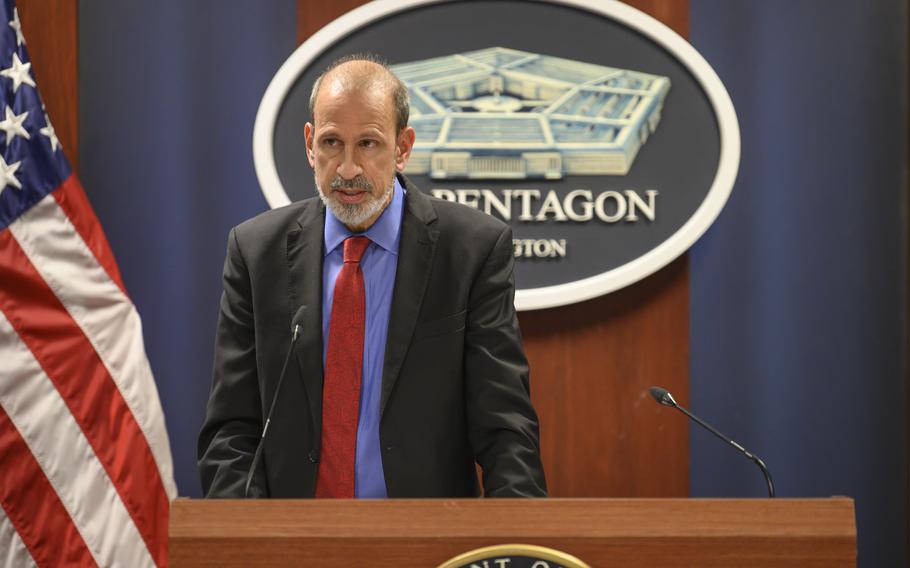
Defense Department Comptroller Mike McCord speaks in November 2021 during a news conference at the Pentagon. (Brittany A. Chase/Department of Defense)
WASHINGTON — A potential plan by House Republicans to slash government spending to fiscal 2022 levels would cripple the Pentagon’s investment in the Indo-Pacific region, force the reduction of the Navy’s fleet and potentially damage recruitment, according to a Defense Department evaluation.
The military’s assessment of the damage that the Republicans’ proposal would inflict also forecasts deep cuts to the modernization of the nation’s nuclear capabilities and planned upgrades to missile defense systems. Spending on defense would decrease by nearly $74 billion from the current budget and fall about $100 billion short of national security needs, according to Pentagon Comptroller Michael McCord.
“After two consecutive years in which Congress has increased the funding level above the levels we have requested, such an immediate about-face to deep cuts to the defense program the president and [defense] secretary believe we need would be extremely disruptive and inefficient,” he wrote in a letter released Monday by Rep. Rosa DeLauro of Connecticut, the top Democrat on the House Appropriations Committee. “Multiple efforts to accelerate our capabilities would have to be stopped in their tracks.”
McCord is set to appear on Capitol Hill on Thursday to discuss the Pentagon's proposed $842 billion budget alongside Defense Secretary Lloyd Austin and Army Gen. Mark Milley, the chairman of the Joint Chiefs of Staff. They are scheduled to testify before the House Appropriations Committee as Congress begins work on the 2024 National Defense Authorization Act, an annual bill authorizing Pentagon expenditures.
DeLauro contacted Austin in January to gauge the impact of a deal reportedly hatched by hard-line House Republicans with Rep. Kevin McCarthy, R-Calif., to make him House speaker in return for a commitment to broad government spending cuts. Some House Republicans also have said they want funding cuts in exchange for voting to raise the debt limit.
“Continued Republican calls for cuts of this magnitude — both secret proposals from Republican leadership and public demands from extremists in the party — would be absolutely detrimental to all Americans,” DeLauro said in a statement issued Monday.
McCord said Austin was troubled by the potential harm the cuts could cause to service members and the military’s ability to recruit.
“Reductions of this magnitude would certainly force severe disruptions to our people, especially because we would still need to fund the pay raises our people deserve and to avoid involuntary separations,” McCord wrote. “This would shift the burden of these cuts toward our training, readiness and recruiting, damaging our cohesion and our ability to respond on the nation's behalf.”
Service members received a 4.6% pay raise this year and could receive another 5.2% boost in the Pentagon’s budget proposed for fiscal 2024, which begins Oct. 1. Paying for salaries as well as increased spending for various service member allowances is unavoidable and would have to be offset by cuts in manning levels or training, McCord said.
Those reductions would drive the military to “a smaller, more overworked, less ready force,” he wrote.
The cuts also would destabilize the industrial base, which depends on stability, predictability and multiyear procurement contracts to function effectively, according to McCord. He said lawmakers who propose such cuts have a responsibility to describe how they wish to see the military “abandon or scale back” its strategy in the Indo-Pacific, Europe and the homeland in order to implement them.
U.S. forces in the Indo-Pacific could be hit hard by funding freezes, forcing the Pentagon to halt a planned 40% spending increase in the region to counter a growing Chinese military, he wrote. The move would delay or degrade infrastructure and capabilities, including investments in munitions such as the long-range, anti-ship missiles, he wrote.
The Navy’s shipbuilding budget also could be put on the chopping block and result in the elimination of at least two ships, most likely a Virginia-class submarine and a destroyer, McCord wrote.
Other weapons would face funding difficulties as well.
Investments in the modernization of the land- and air-based legs of the U.S. nuclear triad — the Sentinel strategic deterrent missile and B-21 bomber program — could see cuts of up to 40%, according to McCord. The Pentagon would have to reduce its 2024 funding request for space-based missile warning and ground-based missile defenses by nearly 50%, he wrote.
“At a time when our allies in NATO and the Indo-Pacific region are increasing their security spending to the levels we have been advocating, a move backward on our part would send the wrong message both to our allies and our adversaries and would undermine and put at risk much hard-earned progress in enhancing our collective security,” McCord wrote.
It is not clear whether Republicans intend to include the Defense Department in the spending cuts that they are proposing but even belt-tightening measures in other government agencies would be just as harmful, he wrote. U.S. support for Ukraine against Russia’s invasion, for example, depends on multiple departments working together, McCord said.
“No one agency could achieve the effects we are producing as a team and deep cuts to any one of the agencies would undermine the effort as a whole,” he wrote.